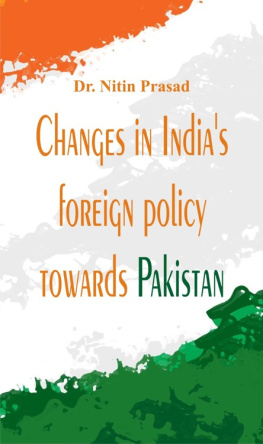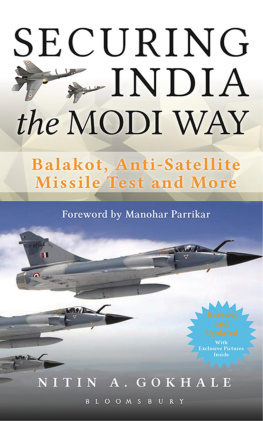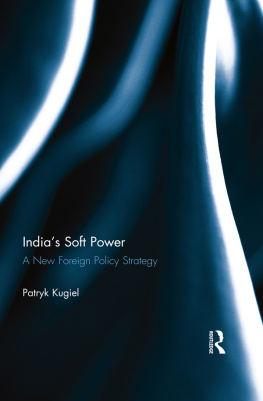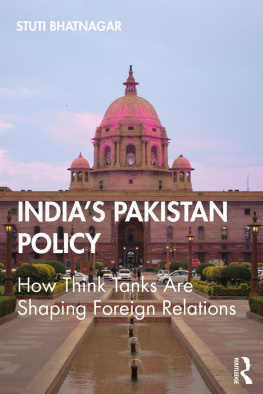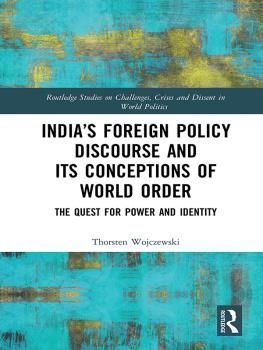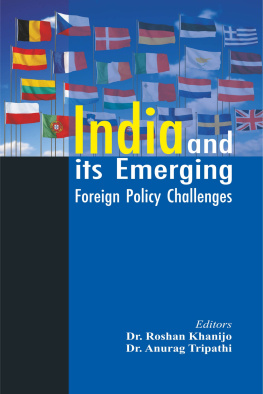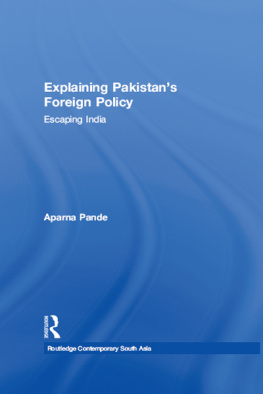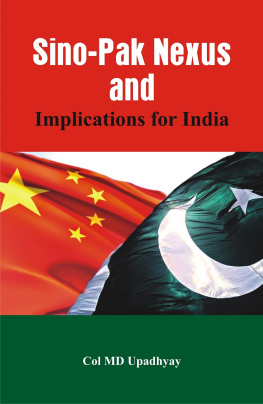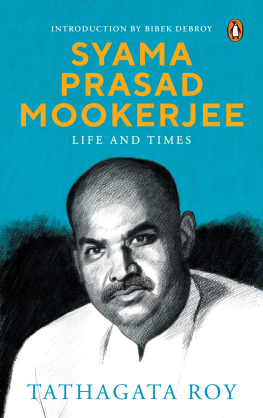Changes in India's Foreign Policy Towards Pakistan
Changes in India's Foreign Policy Towards Pakistan
Dr. Nitin Prasad
Alpha Editions
Copyright 2017
ISBN : 9789386367792
Design and Setting By
Alpha Editions
email - alphaedis@gmail.com
All rights reserved. No part of this publication may be reproduced, distributed, or transmitted in any form or by means, including photocopying, recording, or other electronic or mechanical methods, without the prior written permission of the publisher.
The views and characters expressed in the book are of the author and his/her imagination and do not represent the views of the Publisher.
Contents
Preface
1. Policy toward India and Pakistan
2. Indias Changing Pakistan Policy
3. Senators Indias Aggressive Foreign Policy
4. Modis Foreign Policy: Tough on Pakistan and China
5. India-Pakistan Relations at a Standstill
6. Tasks before Indian Foreign Policy towards Pakistan
7. Modi and Indias Relationship With Pakistan
8. India and Pakistan : Conflict and Wars
Bibliography
Index
Preface
Indias most difficult foreign policy challenge has been Pakistan. At one level, the relationship has been managed reasonably well given the fundamental contradiction between Indias status quo-ist approach on Kashmir and Pakistans determination to alter the status quo. At another, Indian policy-makers inability to meet the challenge effectively reflects the constraints imposed by major policy choices.
For years, the centre of India's foreign policy was Pakistan. Love it or hate it. This was the country that the external affairs ministry had to break its head over most of the times. You can't brush off four wars (1947-48, 1965, 1971 and 1999), two conflicts (Rann of Kutch and Siachen), militancy in Kashmir that claimed tens of thousands of lives and terrorist attacks all over India.
Modi insists that India needs to stop comparing itself with Pakistan. It has been our biggest shortcoming and mistake that we have been tagging ourselves with another country and trying to do things. We are an independent country, we have our own policies and future, he explained. The so-called de-hyphenation may be a fair point, but the Modi government has drawn flak for its approach towards engaging with Pakistan. Most recently, just a week after the Indian prime minister paid a surprise visit to his Pakistani counterparts residence last December, terrorists attacked an Indian Air Force base in Punjab. All the matter is just compiled and edited in nature. Taken from the various sources which are in public domain.
Although the book has involved considerable empirical research, it is not simply fact-finding enterprise. It is also a prescriptive and analytical study intended to create and influence opinion regarding the essentials of policy-making process that would minimize the chances of non-rationality in Indian Foreign Policy.
Editor
Policy toward India and Pakistan
Building on this modest reduction in regional tension, Secretary of State Colin Powell visited South Asia in July 2002 and described both governments as Americas allies in the war on terrorism, projecting an even-handed U.S. diplomatic approach. Yet other statements by Powell seemed to reflect a vague diplomatic tilt toward Pakistan. He accepted the Pakistani position that the infiltration of Muslim terrorists from Pakistan into Indian-controlled Kashmir had declined, despite the skepticism expressed by Indian officials. Moreover, by proposing to place the issue of Kashmir on the international agenda, Powell was siding with Pakistan, which wants Washington to play a more active role in future negotiations aimed at resolving that dispute. India has supported the idea of bilateral Indo-Pakistani talks about Kashmir but refuses to hold them until there is clear evidence that Islamabad has put an end to its sponsorship of terrorism in Kashmir.
Its not surprising, therefore, that New Delhi regards the American view articulated by Powell as running contrary to Indias national interests as well as reflecting a distorted analysis of the current Indo-Pakistani tensions and the balance of power in South Asia. What the Bush administration has done through its attempt at mediation has been to help a weak Pakistan to strengthen its diplomatic hand in the confrontation with a more militarily powerful India. Musharraf, like Soviet leader Nikita Khrushchev during the 1962 Cuban missile crisis with the United States, recognized that the conventional and nuclear military balance of power favored the other side. And, like Khrushchev, he had no choice but to submit to the ultimatum imposed on him and bring an end to the terrorist infiltration into Indianheld Kashmir (in the same way that Khrushchev had to withdraw the nuclear missiles from Cuba).
The Bush administrations diplomacy involved more than just helping Musharraf save face. It helped reduce the pressure on the Pakistani leader by hailing his public commitments to prevent terrorists from slipping into India. But Musharrafs anti-terrorist measures proved to be temporary, enabling him to preserve U.S. support without actually ending the backing forMuslimmilitants in Kashmir. Pakistan continues to tolerate the presence of terrorist camps on its side of the line of control in Kashmir, allowing the anti-Indian militant groups to maintain their communication networks and logistical backup in Pakistan. And while the infiltration of terrorists did slow initially after Musharrafs pledges were given to Washington, it has resumed at a level almost as high as before June 2002.
Equally important, the Indians resent what they consider the double standard that Washington applies in its war on terrorism in South Asia and the Middle East. Indias position on talks with Pakistan has not been very different from that of the Israeli government, which has refused to restart negotiations with the Palestinian Authority until the latter takes concrete steps to end terrorism. The Bush administration has regarded Israel as a partner in the war on terrorism, accused the PA of supporting anti-Israeli terrorism, and refrained from treating those two entities evenhandedly. Indeed, unlike in the case of India and Pakistan, Washington has not only expressed total support for Israels preconditions for talks with the PA but has also called for the removal from power of PA president Yasser Arafat. President Bush, who has refused to meet with Arafat, has also linked any U.S. support for the Palestinians to their adoption of an ambitious agenda of political and economic reform. But Musharraf, a dictator whose military coup brought an end to Pakistans democratic political system and whose main base of power is the political axis between Pakistans leading anti-democratic forces (the military and the religious establishments), was invited to the White House and was showered with military and economic assistance. Indian leaders have noticed that inconsistency.
Pakistan under Musharraf has had even more ties with terrorism and anti-American groups and policies than the PA has had under Arafat. In fact, when President Bush declared that the next phase of the anti-terrorism campaign would be aimed at pressing the members of the so-called axis of evil not to develop chemical, biological, and nuclear weapons and stressed that the war against terrorism would be grounded in a set of universal values, including the rule of law, religious freedom, and respect for women, he could legitimately have included Pakistan in that axis. After all, Pakistans leaders have maintained close ties to radical Muslim terrorist groups and have pursued successful efforts to acquire weapons of mass destruction (WMD). And they have either supported or tolerated policies with clear anti-Western and pro-militant Islamic orientations that are the antithesis of the universal values that the Bush administration is supposedly promoting.

